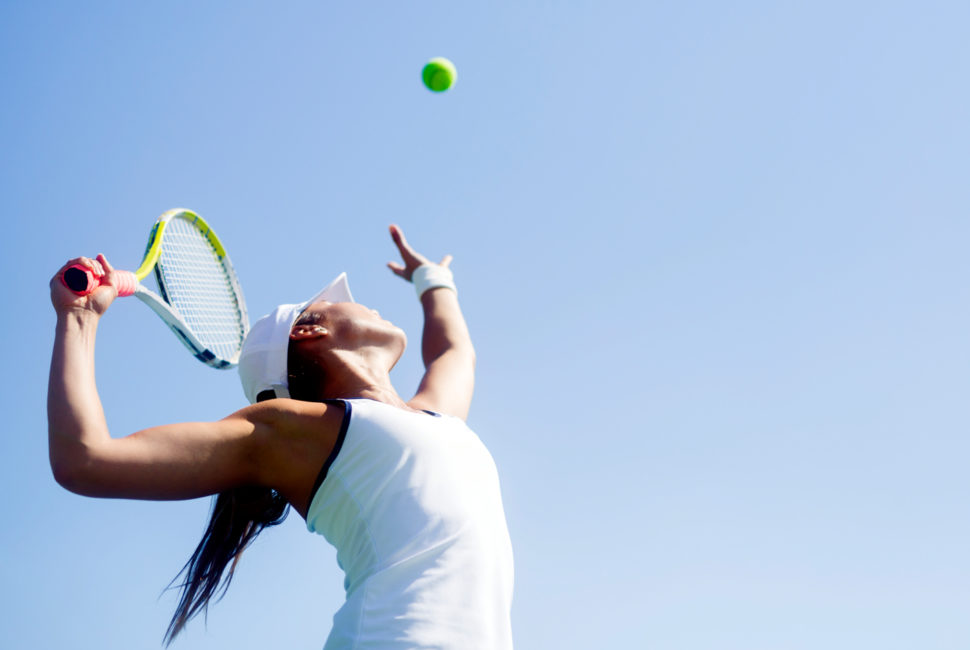Tennis Helps Maintain Wellness

I have been fortunate enough to serve as an off-campus physical education coordinator for what has now been three semesters. This endeavor has afforded me the opportunity to get to know some of the students better and enjoy exploring more cerebral, academic subjects. One of the most apropos themes that we study is the idea of “wellness.” In particular, we learn that there are four parts to complete personal wellness: physical, mental, emotional, and social. Naturally, I have taken this idea and applied it to the world of tennis as a way for the students to better understand their chosen craft.
Let’s take a moment to not only understand the individual ideas of wellness but to relate them specifically to the sport of tennis
Tennis and Physical Wellness
Of the four categories of wellness, I think that physical wellness is the easiest to comprehend. Immediately, ideas of cardiovascular capacity, muscular development, and other physical items come to mind. However, physical wellness is much broader than that. To be have complete physical wellness, one must not only be able to have cardiovascular stamina and strength but also have competency in sport-specific skills: agility, coordination, balance, etc.
Tennis absolutely can help in developing well-rounded physical wellness. A fundamental move such as reacting to an on-the-run forehand can explore many of these elements. One must have the reaction to move to the side and the agility to change position. Next, the player must judge the ball in relation to their body and coordinate movements prior to ball striking. Lastly, the player will need the balance at impact and through the swing to create proper friction and torque. This example is only one of countless moments in playing tennis that take the idea of physical wellness beyond our initial comprehension.
Tennis and Mental Wellness
In our health class, we discuss the idea of mental wellness as keeping our cognitive processes fine-tuned and challenged. One can think of the advice for retirees to maintain mental engagement to avoid the onset of dementia.
Once again, tennis augments our wellness as it challenges the player to problem solve both in the long-term and the short-term. Any competitor worth their salt will tell you that winning a tennis match requires problem solving. A well-prepared player will have a game plan going into a match and then will have to think and react quickly within a point to employ that strategy. Moreover, sometimes one must tweak or overhaul their game plan midstream if things are not working as planned.
Tennis and Emotional Wellness
Oftentimes I hear coaches and players discuss “mental toughness” when what I really think they are referring to is the ability to control their emotional responses. Nervousness, anger, excitement, etc. are not mental processes but instead they are emotional responses. Being emotionally well means maintaining stability in positive and negative emotions.
I would argue that tennis more than any other sport challenges the player to maintain emotional health. One missed serve can send the best of players into an unrecoverable tailspin. Those that have a grasp of an idea called “emotional intelligence” can learn to thrive in stressful situations as they know which emotions will lead to success and which emotions need avoidance. Therefore, the a player who learns to manages stressful situations in tennis can in turn use this skill to handle other ups and downs that life throws their way off the court.
Tennis and Social Wellness
Social wellness increasingly is becoming a challenge for our society as jobs and technological amenities make personal interaction scarce. Yet, we need human contact and interaction to maintain our wellness. Whether introverted or extroverted, exposure to others is healthy and stimulating and we need outlets to find like-minded individuals.
While we may think of tennis as an individual enterprise, coming to clinics or kids’ classes allows students to interact with others that share the common interest of the sport. Additionally, the United States Tennis Association has made a strong push towards team tennis not only for adults but also for the junior players. Involving yourself or your children on a tennis team is a fantastic way to maintain social health and build a base of friends. While a singles match requires solitary actions, the confidence and support that we gain from our teammates can help us achieve new heights.
-Coach Michael MacVay

